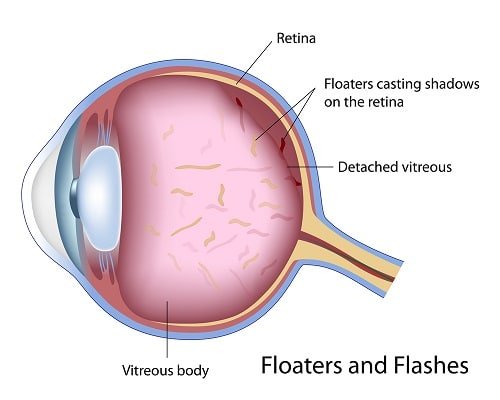Floaters After Cataract Surgery- Is It Common?
Having floaters after cataract surgery is a pretty common issue in people. If you have recently had cataract surgery and see something that looks like bits of dust or spider webs that frequently move or “float” in any direction, you know, you probably have floaters.
Most patients have floaters before they go for cataract surgery, but the consequences of the cataract on their eyesight make it tougher to acknowledge a floater. Typically, once you opt for surgery to have the cataract removed and the vision progresses, your capacity to see the floaters is also enhanced.
While it might be slightly irritating at first, the great news is that there is most probably no requirement to bother about this prevalent condition. A few of the floaters will vanish away with time.
Here’s all you need to know for those highly concerned about getting floaters after cataract surgery.
Cataract Surgery

The lens is the section of the eye that adjusts and focuses light, serving us to see everything. Cataracts make the lens of our vision cloudy and unclear. Thus it becomes harder to see objects. Surgeons can practice surgery to eliminate cataracts. The doctor will take out the clouded lens and substitute it with a different artificial lens through this surgery.
Like every procedure, cataract surgery has a few possible side effects — one of the side effects is floaters. Please continue reading to discover more about floaters, why cataract surgery might be a problem, and how they can be treated.
What are floaters?
Floaters are dark shapes that float or move across the patient’s field of vision. There are many different ways of describing floaters. Below given are some:
- webs
- squiggly lines
- strings
- bubbles
- hair
- spots
- specks
Floaters move as your eyes move, which lets you look at them straight, a little tricky. However, once you stop rolling your eyes, you will see that floaters will still proceed to float across the field of vision.
Most of the time, the issue of floaters occurs due to average age-related differences that take place within your eye. So, what exactly are floaters?
Your eye includes a gel-like element called the vitreous fluid. The vitreous functions are to maintain the state or shape of the eye. It also comprises fibers that join it to the cover of your retina, the terminal portion of the eye that receives and senses the light.
When you age, fibers present within the vitreous may start to contract or shrink and draw away from the retina. These fibers may also clump or stick together. When the aforementioned happens, shadows are scattered onto the retina. These shadows projected resemble in the form of floaters to the eye.
Floaters after cataract surgery- Why does this happen?

People who have gone through cataract surgery are at a heightened risk of forming floaters. There are some possible causes of floaters after cataract surgery. Let’s explain and explore them below.
1. Preexisting floaters
Likely, the floaters were already present before you went for the cataract surgery. As you already know- cataract surgery serves to clear the vision. You simply might be detecting preexisting floaters more precisely after the surgery has been performed.
2. Retinal tear or detachment
In unusual cases, Posterior Vitreous Detachment from cataract surgery may lead to a split inside the retina. This may occur if vitreous fibers resume tugging onto the retina through the surgery or after surgery.
The strength employed onto the retina may lead to the formation of a tear. Retinal tears may advance to retinal detachment. Both ailments may lead to loss of vision in the affected eye. Floaters could be a sign of a retinal detachment or tear.
3. Posterior vitreous detachment (PVD)
Posterior Vitreous Detachment is how the vitreous contracts and draws away from your retina. This usually happens naturally when we age and may lead to floaters.
Cataract surgery includes handling the eye to incorporate a new artificial lens. This may drive to shifting of the vitreous, leading to PVD. Some additional factors that might add to the advancement of PVD after cataract surgery incorporate things like:
- surgical procedure
- complications through the surgery
- preexisting eye diseases, such as critical nearsightedness.
4. Additional causes
Floaters may develop from other causes apart from what is discussed above. Some additional potential explanations of floaters after cataract surgery include:
- infections in the eyes.
- eye injury
- bleeding within the eye
- uveitis, a swelling of a particular tissue in the eye known as the uvea
What are the symptoms of a severe post-surgical complication or side effect?

Floaters can signify a potentially severe side effect after cataract surgery, such as a retinal tear or detachment. Other symptoms of these conditions include:
- unexpected flashes of light
- a gray screen that obstructs part of the field of vision
- a dark shadow in the peripheral (side) vision
Other symptoms of a severe post-surgical side effect or complications from cataract surgery include:
- pain in eyes that does not go away with medicines
- extremely red eyes
- any vision loss
If you undergo any of the signs described earlier, contact a surgeon or eye doctor immediately or visit the emergency room.
How are floaters after cataract surgery managed?
The strategy to treat floaters after cataract surgery is based on what is causing them in the first place. An eye specialist will practice a dilated eye exam to determine what might be causing the floaters after cataract surgery.
If floaters occur naturally due to aging or Posterior Vitreous Detachment, they typically do not need treatment. But, if floaters impact the quality of life significantly or deteriorate your capacity to see, the eye doctor might recommend a procedure known as a vitrectomy.
This method involves removing the vitreous from the eye and substituting it with saline. When the vitrectomy is carried out to treat the retinal detachment problem, the vitreous might be substituted with oil or air.
Minute retinal tears might be fixed using a freezing probe or laser. But, large tears such as retinal detachments will require to be managed surgically. In such cases, there are various operational procedures that doctors might carry out.
What’s the possibility for people with floaters after cataract surgery?
The outlook for floaters after cataract surgery or simple floaters is commonly suitable. In a few people, floaters might go away over weeks or months. In different cases, you might adjust to the appearance of floaters and not see them as you used to in the initial days.
People with highly critical floaters that affect their vision and everyday life might be treated using vitrectomy. However, this method has its dangers and side effects, so make sure to address these with your eye doctor before opting for surgery.
Retinal tears and detachments may lead to permanent loss of vision. But, treatment with surgery or medical procedure often goes well if these ailments are identified and approached early.

